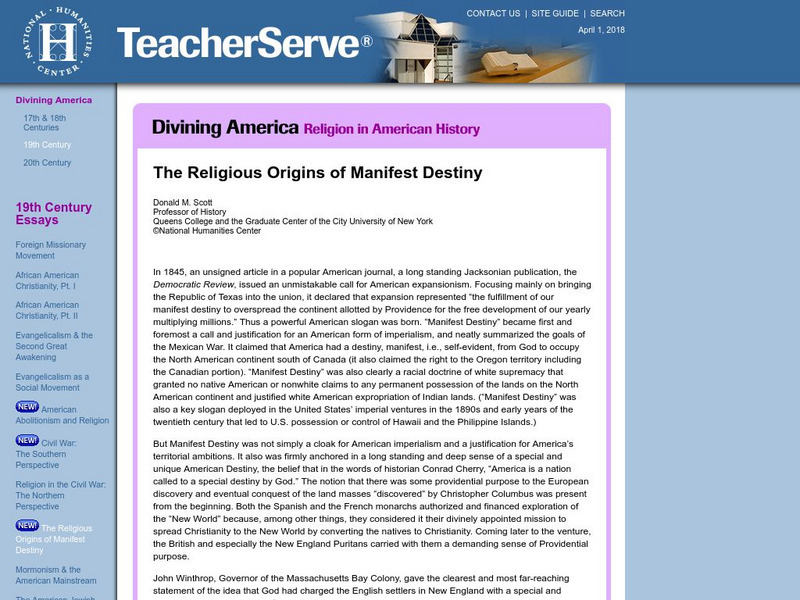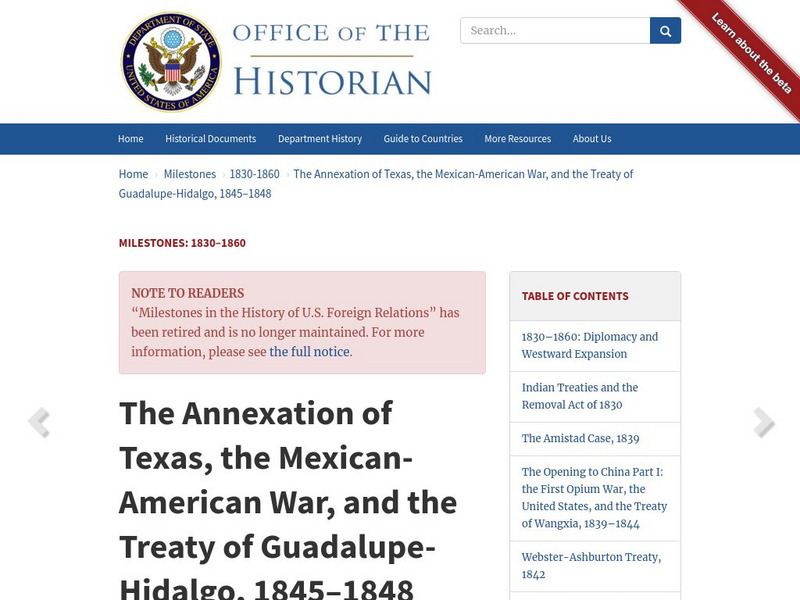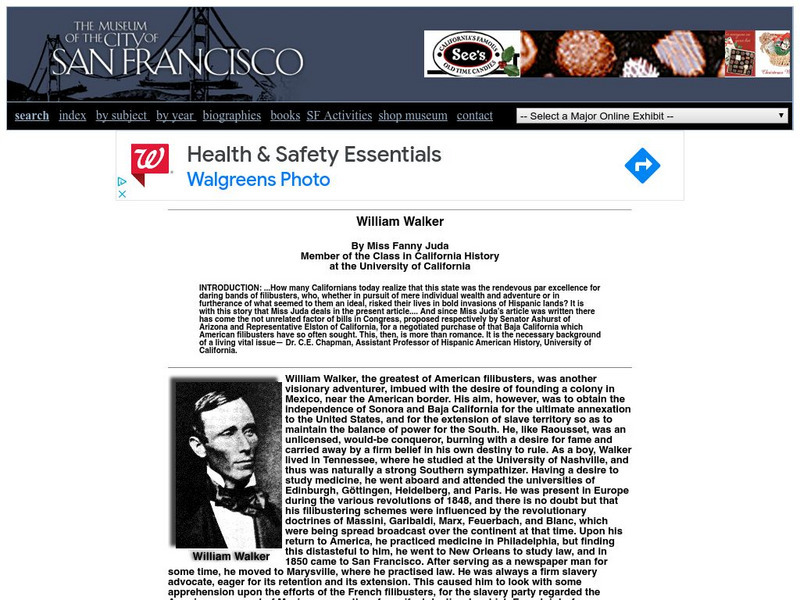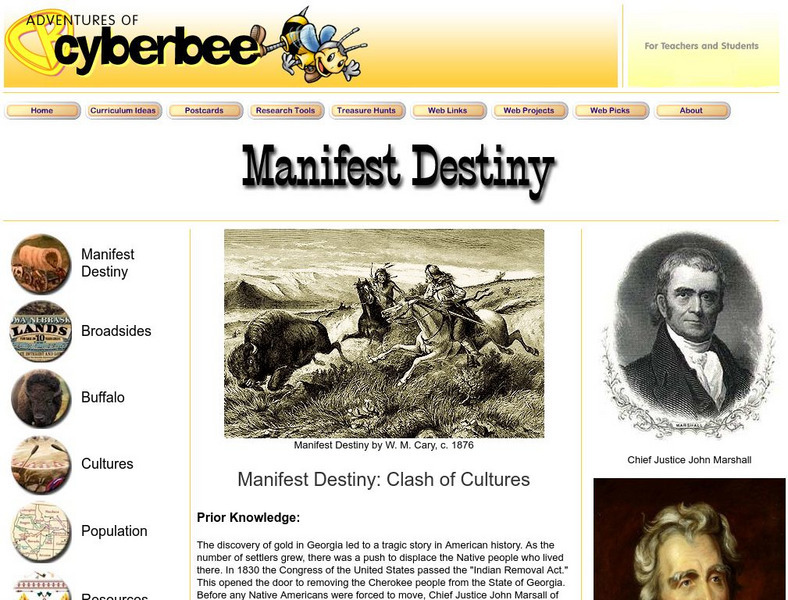National Humanities Center
National Humanities Center: Toolbox Library: Gilded and Gritty: Empire: Manifest Destiny and Beyond
A collection of primary resources, timeline, questions for discussion, and links to supplementary materials on America's westward expansion and the response to shifting roles and policies at home and abroad.
National Humanities Center
National Humanities Center: Teacher Serve: The Religious Origins of Manifest Destiny
Essay discussing Manifest Destiny and divine providence in westward expansion. Questions for student writing and discussion, scholars debate and links to related resources.
PBS
Pbs: Prelude to War: Manifest Destiny
An introduction to Manifest Destiny - the period in American history covering continental expansion. In sharp contrast is Mexico's struggle to recover after gaining its freedom from the Spanish. Links and drop down menus provide detailed...
Other
Humboldt Univ.: Political, Economic and Social Consequences of Manifest Destiny
An extensive look at the consequences of manifest destiny, with emphasis on six different topics for student discussions. These include the growth of a national market economy, the impact of drastic economic changes on American society,...
Stanford University
Sheg: Document Based History: Reading Like a Historian: Manifest Destiny
[Free Registration/Login Required] Students use primary source documents to investigate central historical questions. For this investigation students use nineteenth-century maps and art, and consider the roots of American exceptionalism.
PBS
Pbs Learning Media: Primary Source Set: Manifest Destiny
This collection uses primary sources to explore the idea of Manifest Destiny and its influence.
University of Groningen
American History: Essays: Manifest Destiny: Philosophy That Created a Nation
A discussion of how Manifest Destiny became a philosophy that justified and fueled Americans' ideas about expansion and annexation of new territories.
University of Groningen
American History: Essays: Manifest Destiny: Components of Manifest Destiny
A discussion of the ideas that fueled Americans' belief in Manifest Destiny, including religious conviction and a sense of mission that they needed to dominate the land from coast to coast. This led to the drive to displace Native...
University of Groningen
American History: Essays: Manifest Destiny: Many Shades of Manifest Destiny
A discussion of the other guises of Manifest Destiny, including imperialism, yellow journalism, the idea of the white man's burden, the Monroe Doctrine, and the Roosevelt Corollary.
US Department of State
U.s. Department of State: Office of the Historian: Milestones: 1830 1860
Concisely written accounts of three important events in the history and shaping of Texas: the Annexation of Texas, the Mexican-American War, and the Treaty of Guadalupe-Hidalgo.
Independence Hall Association
U.s. History: Manifest Destiny
A look at the reasons for westward expansion, known as Manifest Destiny. Economic, religious, and cultural reasons pushed Americans from sea to shining sea.
Khan Academy
Khan Academy: Manifest Destiny
This Khan Academy resource provides notes for American History. "Manifest Destiny" is explained on this resource, along with the implications associated with expansion of the North American continent.
History Tools
History Tools: John O'sullivan Coins the Phrase Manifest Destiny 1845 [Pdf]
What was "manifest destiny"? In this excerpt, learn the role race played in American expansionism and the proposed addition of Texas to the United States.
Museum of the City of San Francisco
Virtual Museum of the City of San Francisco: William Walker
This is an in-depth site from the Museum of San Francisco covering the adventures of William Walker, including his conquering of Nicaragua.
Alabama Learning Exchange
Alex: Manifest Destiny and Westward Expansion
Students engage in a discussion of "Manifest Destiny" using a timeline of events from 1830 - 1860, and a biographical sketch of a real person who lived during that time period. During the discussion, students will use the biography to...
Khan Academy
Khan Academy: Us History: 1844 1877: Manifest Destiny
In the mid-nineteenth century, newspaper editor John O'Sullivan coined the term 'manifest destiny' to describe the belief that God intended for the United States to occupy North America from Atlantic to Pacific.
Khan Academy
Khan Academy: Us History: 1844 1877: Manifest Destiny
A quick comprehension check over the Manifest Destiny.
Digital Public Library of America
Dpla: Manifest Destiny
From twentieth-century posters, monuments, and letters to nineteenth-century maps, biographies, and paintings, this set allows students to gain a greater understanding of how perceptions of manifest destiny have changed over time.
iCivics
I Civics: Manifest Destiny
Learners will learn about the ideology of Manifest Destiny and how it affected different populations and demographics of the U.S. during its expansion.
Ohio State University
Osu History Teaching Institute: Manifest Destiny and Westward Expansion
This lesson looks at ways that the ideology of Manifest Destiny expressed both national political objectives and the goals of ordinary men and women who settled the west.
Cyberbee
Manifest Destiny: Clash of Cultures
A unit plan about the Manifest Destiny that includes an explanation of the term as well as additional resources.
University of Groningen
American History: Essays: Manifest Destiny: The New Manifest Destiny
While many thought that the doctrine of Manifest Destiny had spent itself when Americans reached the Pacific Ocean, it could also be seen to extend beyond the shores of the United States. For example, Hawaii and Alaska were acquired later.
University of Groningen
American History: Essays: Manifest Destiny: To the End of Time
Explains what the term 'Manifest Destiny' meant during the expansion of the frontier as the United States grew and consolidated its borders.
Digital History
Digital History: Manifest Destiny
A brief explanation of where the term "manifest destiny" came from, and a look at how the term meant different things to different segments of American society.




















